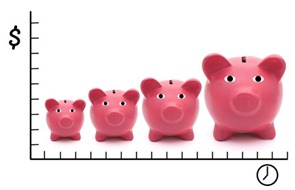 A money market account allows you to deposit money and earn a higher interest rate than you would if you invested money into a traditional savings account. Money market accounts are commonly considered short-term investment options and great places to store emergency cash. In order to use a money market account correctly you will need to agree to the terms and conditions which may include details pertaining to a minimum monthly balance amount and only having 6 or less withdrawals per month. Reading the fine print of the money market account is vital in order to choose the right one and to ensure you are not paying too much money toward fees and other things. Like any investment, there are pros and cons to money market accounts including the following:
A money market account allows you to deposit money and earn a higher interest rate than you would if you invested money into a traditional savings account. Money market accounts are commonly considered short-term investment options and great places to store emergency cash. In order to use a money market account correctly you will need to agree to the terms and conditions which may include details pertaining to a minimum monthly balance amount and only having 6 or less withdrawals per month. Reading the fine print of the money market account is vital in order to choose the right one and to ensure you are not paying too much money toward fees and other things. Like any investment, there are pros and cons to money market accounts including the following:
Interest Rate
One of the biggest pros to a money market account is the interest rate. While the interest rates may never be up to 5% again, they are still much higher than the interest rates from a traditional savings account and even higher from many CD accounts. Money market accounts will pay interest that is beneficial for short-term emergency cash needs but may not be justifiable for long-term investment gains. One downside to the interest rate on a money market account is that the interest amount is taxable. The interest rate is subject to change at any time, which can leave you earning more or less than you originally planned. Due to the fluctuations in the interest rate, it is important to research all of your options to find the bank or credit union with the best interest rate and fee amount.
Security
A nice pro to money market accounts is that they are generally very safe investments. Most of the money market accounts are backed by the FDIC, in which you will have security up to $250,000. It is important that you research the financial institution before investing to ensure they are backed by the FDIC.
Flexibility
The money you invest in a money market account is usually easy to transfer to another account and most accounts do not have penalties for early withdrawals. The downside is that you are limited to a certain number of withdrawals per month, which usually ends up being somewhere between 3-6 depending on the financial institution. Although the accounts are generally easy to maintain some banks will charge a monthly fee to keep the account in operation. If you do not have a high balance amount, you could be paying more in fees than you earn in interest money. Larger banks often charge fees if you do not carry a set balance requirement.
Easy Way To Earn
If you are already setting aside some money each month toward to your savings account, setting aside these funds to a money market account may make more sense so you can earn more. Since you can acquire the money at any time you need, it makes a money market account a more attractive savings option. Typically a transfer to your bank account from your money market account will take about 5-7 business days.
